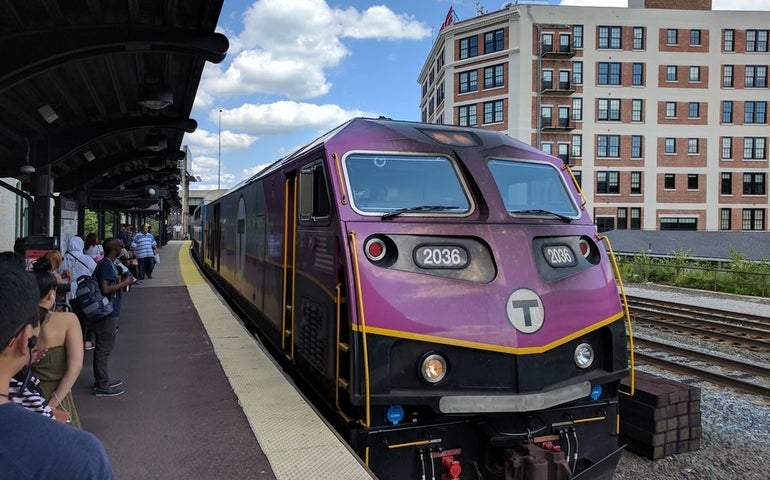The MBTA Board voted unanimously Thursday to extend the agency’s contract with Keolis Commuter Services, which operates the authority’s commuter rail network, for one year to mid-2027.
MBTA officials in 2020 had agreed to extend the Keolis contract through June 30, 2026, with the option for another one-year extension. T officials said the extra year will give the agency more time to reimagine the future of commuter rail service.
The commuter rail system connects communities in eastern Massachusetts, Rhode Island and downtown Boston with 137 stops throughout the region, according to the T. The service area includes 12 routes that run seven days a week, plus service from Boston to Gillette Stadium and Providence for special events.
Michael Muller, executive director of the commuter rail for the MBTA, pitched the board on the contract extension, and said the MBTA has never selected an incumbent company to continue its commuter rail contract.
“Given the vision for rail modernization, electrification and transforming the current traditional commuter rail model into a high frequency regional rail service, I think what we’ve learned is the current contract model that we’ve always had is not designed to accommodate that kind of significant capital investment in partnership with the operator,” Muller said.
The commuter rail is examining the different types of contract structures in the industry, he said.
“For example, our contracts have generally been eight years in duration with optional extension years. Elsewhere in the world and domestically, where there are partnerships for capital investment, the duration of the contract can be much longer, 15 or 20 years. And we’ve heard feedback from stakeholders and from the industry that a longer contract model would be preferable,” Muller said.
A T spokesperson said in February that the T was “considering potential alternative approaches for its successor contractual structure,” with a focus on achieving a decarbonized, high-frequency “region rail” service in both directions.
“There have been significant developments in passenger railroad technology and operations worldwide since the current structure was developed, and MBTA is considering whether different contractual structures may better serve the communities of Massachusetts,” said T spokesperson Joe Pesaturo, who added, “The plan for the next procurement is to identify a partner who can help deliver on this vision via a new, innovative operating contract structure.”
The commuter rail is owned by the MBTA and the state agency controls fares, schedules and maintenance requirements. But for decades it has contracted out the operation of the railroad for a fee to an outside company. Amtrak had the contract in the 1980s, followed by the Massachusetts Bay Commuter Railroad Company, and the agency now has a contract with Keolis.
“These procurements have been significant in the sense that it’s not the case that historically we’ve always just gone with the incumbent,” said MBTA Board Chair Thomas Glynn.
The agency has issued a request for information about new contracts. They’ve gotten about 20 responses, and the next stage is to make a decision on a new contract model by October. On this timeline, the T will shortlist bidders by the end of 2024 and release a final request for proposals by late fall 2025. They’re expecting to pick a new operator by fall of 2026 — which coincides with the next gubernatorial election — and mobilize the transition in the first half of 2027.
The one-year extension of the Keolis contract will cost the state about $20.82 million by fiscal year 2027. This amount is intended to reflect the possibility of annually escalating rates in a new contract with unionized commuter rail workers.
Negotiations are ongoing between Keolis and unions representing more than 2,000 employees. Two months ago some of those workers came to the MBTA board meeting to describe low pay and lackluster benefits.
“For years, the MBTA has treated the commuter rail as the illegitimate stepchild of the MBTA, only paying child support to whoever runs it, and the provider takes their cut before it comes down to us,” said Ed Flaherty, president of Local 2054 Transportation Workers Union, which represents car inspectors and coach cleaners at Keolis, Amtrak and CLX.
Flaherty said there were significant disparities between commuter rail worker wages and their counterparts at other agencies.
“Today, we are the lowest-paid by far,” Flaherty told the board, describing his colleagues as paid 12 percent less than Amtrak workers, 16 percent less than workers at Metro North, and 11 percent less than workers at New Jersey Transit.
Quincy Mayor Thomas Koch, who serves on the MBTA board, asked Muller if the contract extension would address some of the union’s concerns.
Muller did not directly respond, but said the costs of the one-year extension with Keolis “would include the cost of some of the things that are currently being discussed between Keolis and the union representatives in negotiations.”
“We value that workforce,” said Phil Eng, general manager of the MBTA. “This one-year extension not only helps us with the RFP, but it does facilitate the ability to resolve some of those issues. And I think that’s, without getting into too many specifics on the ongoing negotiations between Keolis and their unions, we’re fully cognizant of it. And we want to be partners in this,” Eng said. “So I think the answer is yes, we are cognizant and we do believe this will assist.”

